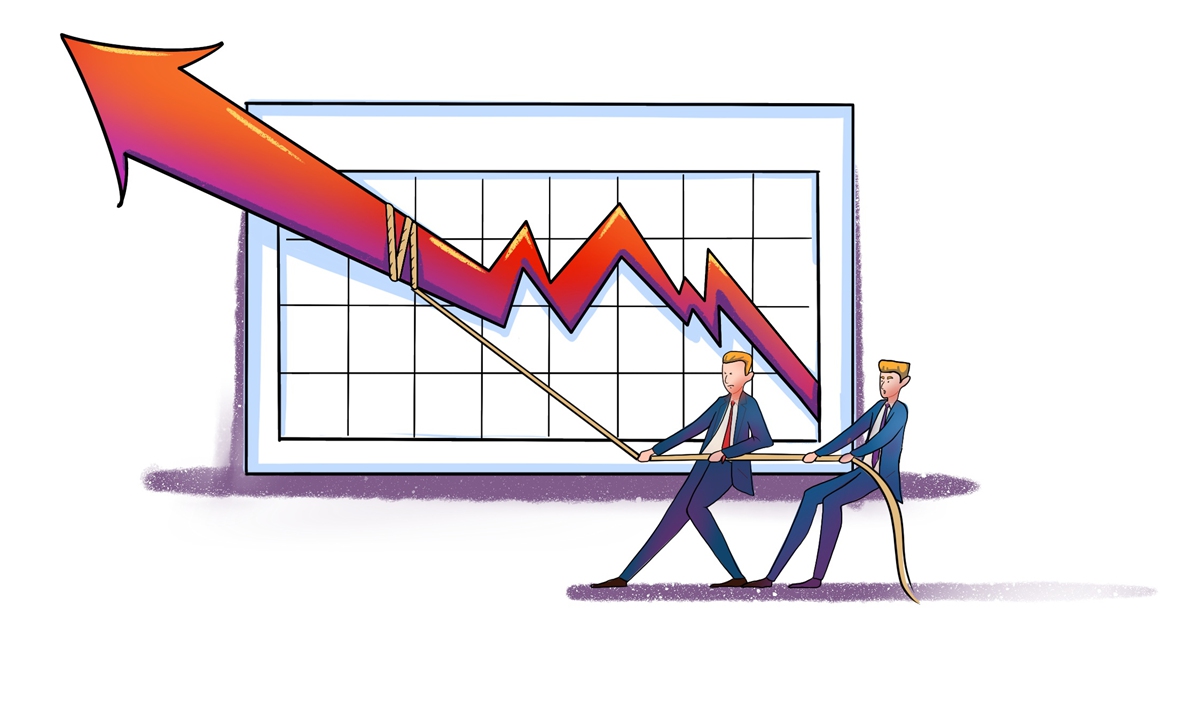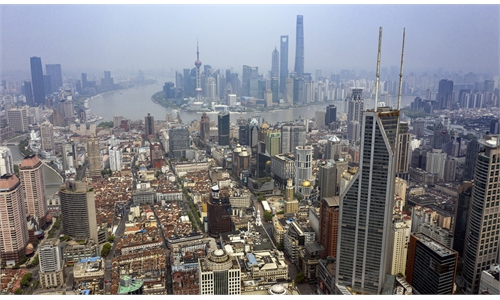
Illustration:Tang Tengfei/GT
When Chinese provinces and cities take quick and effective anti-epidemic measures to combat a ferocious Omicron flare-up, while taking concrete measures to promote an orderly resumption of production, some Western media outlets have spared no effort to undermine China's "Dynamic Zero COVID" policy.
US media Barron's claimed that "Beijing lockdowns stoke fears of continuing hit to China's economy" and investors in China and globally are fearing a prolonged impact from the country's "draconian" anti-epidemic measures. Earlier, The Wall Street Journal said that China's "severe Covid-19 restrictions" are emerging as "the largest threat to its growth."
According to these wildly exaggerated narratives in the Western media, China's economy is rapidly slowing down, and the lives of Chinese residents in areas affected by the Omicron wave have been severely disrupted. They suggest the culprit for all these economic impacts is China's epidemic prevention measures, which is actually the opposite of the truth.
Since the outbreak of the COVID-19, China's active anti-epidemic policies have proven to be effective and have made great contributions to domestic and global economy. Without scientific, accurate and active anti-epidemic measures, the world's second largest economy and the top trade partner of more than 120 countries, would not be able to realize nationwide production resumption and help stabilize global trade in 2020.
Thanks to the effective anti-epidemic efforts, China became the only country in the world that achieved the positive economic growth in 2020. In 2021, despite sporadic outbreaks within the country and near out-of-control spread in many countries, China's economy posted an 8.1 percent GDP growth, defying market expectations and further cementing its leading position in the global economy's recovery.
This round of Omicron outbreak is highly infectious and poses the risk of silent transmission, which has indeed brought more challenges than expected to China's economy and society. Yet, instead of taking a "lying flat" approach like the US, China has opted to stick with its previously successful "Dynamic Zero COVID" policy.
It should be pointed out that in the face of highly complex situation during this current Omicron outbreak, China's anti-epidemic policy is by no means as simple and rough as some foreign media have distorted. On the contrary, the specific measures that are dynamically adjusted according to the specific situation of each location not only protect the public health to the greatest extent in the fight against the epidemic, but also ensure the normal economic activity as much as possible. Now, the effect of the active anti-epidemic policy is gradually showing.
China this week has reported its lowest number of new COVID-19 cases in three weeks. As Beijing timely takes measures including large-scale testing to stamp out flare-ups driven by the highly transmissible Omicron variant and officials strive to minimize economic disruptions, there have been no widespread business closures, and consumption is expected to bounce back once the latest outbreak is brought under effective control.
Shanghai, which is in tough fight against virus, has halted COVID-19 transmission chains in communities in many parts of the city, and continued to see decline in new cases in recent days. Moreover, according to media reports, after the implementation of "white list" and other policies, 70 percent of key enterprises have resumed production.
China's efforts to fight the epidemic have not put the economic growth goal aside, as some Western media have suggested. China is building a balance between active epidemic prevention and economic growth. China's approach has minimized the economic impacts of the outbreak. After continuous optimization, China's dynamic zero epidemic prevention policy has not only withstood the test of Omicron, but also laid a solid foundation for economic recovery.
Recently, the International Monetary Fund and international financial institutions have downgraded China's economic outlook for this year, but these forecasts do not fully reflect its economic resilience. China's economic performance has beaten wide expectations in the first quarter with a 4.8 percent growth. Once the Omicron wave is put under control, the foundations and resilience of China's economy will support it to recover swiftly and once again exceed the expectations of outsiders this year.
The author is an editor with the Global Times. bizopinion@globaltimes.com.cn



